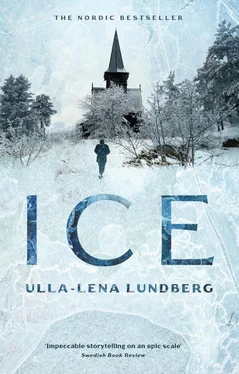“No,” Doctor Gyllen says. “Don’t tell me such things. I no longer dare to hope.”
“But it’s true, Irina. Be happy! We’ve been waiting for this for nine years.” He starts telling her who the letter came from— the child’s aunt in Kazan—and how the letter made its way to Finland. They can’t make contact directly because of the regime, but they have a go-between, a good person, whose name can’t be mentioned over the phone, with contacts in the legation. “Irina, you can write. They can write.”
“Thank you,” Doctor Gyllen says. “There’s nothing I can say. My heart too full. I’ll write to you later this evening. To him. Yes? Oh God. What can I say?”
Now Mama comes on. “How wonderful that I’ve lived long enough to see this happen!” She talks on, while Doctor Gyllen stares out the window. A light wind, a little snow. The first patient already arriving, sweeping the snow off his boots on the steps. The medical assistant pottering about downstairs, wondering why she doesn’t come down. They usually do a little run-through before the day starts.
“I have to go to work,” Doctor Gyllen says. “We’ll talk later, we’ll write. It’s like Pastor Kummel’s death, but the opposite. It’s incomprehensible.”
She rings off and is about to go downstairs, but instead she makes another call, to her dear friends the Hindrikses on the Örlands. Greta answers, and when she hears that it’s Doctor Gyllen, she says, “We do nothing but cry. We just can’t believe it’s true. If only the doctor had been here, we keep saying. If the doctor had been here, maybe he could have been saved. But they say he was in the water too long. They worked on him all night, but not a sign of life. How could it happen?”
It could be that Doctor Gyllen called to tell them about her son, but she sees that on the Örlands there is no space for anything but the priest. That’s as it should be, and she’s glad she said nothing, for in the course of the day’s work and later, at home, having her evening tea, Doctor Gyllen works through a lot of thoughts—religious superstitions she never imagined she was capable of. It’s about a simple coincidence, one of many in the course of a long life, nothing to get worked up about. No cause for a lot of overwrought religious speculation.
But the connection can’t help but inspire quite alien ideas. Pastor Kummel had promised to do everything in his power. Smiling, he spoke of the miracles that a man in his position could hope for. Every cell in her body tells her that Pastor Kummel went to the foot of the throne and offered his own life in exchange for her son’s.
For much of her adult life, the resources have been so meagre and the need in some cases so pressing that it seemed to her more and more that there was a fixed, inadequate quantity of things in the world. If someone comes up in the world and basks in the sun a bit, then that well-being and sunshine are denied someone else. It’s the same way with things like joy and success. The sum total is paltry. If a little love and happiness come our way, someone else is deprived of them. Envy, which is such a stone in our path, derives from this insight, as does our reluctance to reveal our good fortune to others.
She has now regained her son, while Mrs Kummel has lost her husband. The thought is childish and shameful, unworthy of a well-educated, rational adult. It’s a passing impression, the result of two shocks one right after the other. Of course that’s all it is, and she needs to remind herself of that fact forcefully. She must resist, establish some distance from the rational woman scientist who finds herself weeping by her teacup. Half the night before the funeral of Pastor Kummel, whose stiff, frozen, dead body she can picture all too clearly. She weeps, too, for the care and attention she knows this body is being shown, in contrast to the countless labour-camp prisoners, her husband perhaps one of them, whose bodies are disposed of like so much offal. And alongside them, her son, risen from the dead. Behind him and Pastor Kummel are millions of people born and died, without meaning, suffering unfathomable pain. How can the Christian church call its God good?
She manages to prevent herself from falling on her knees and thanking God for her son’s rebirth and asking him to receive Petter Kummel’s soul. It’s a good thing that she doesn’t have to attend his funeral, she who in her present state would disgrace herself by weeping uncontrollably.
BEFORE THE FUNERAL CAN BEGIN, they must pass all the stations of the cross—rising; washing quickly at the washstand; dressing, which is no small matter considering the cutting wind outside; making the beds; building a fire in the tile stove; carrying out the chamberpots; waiting in line for use of the outhouse; breakfast. Frightening to see Mona, white against black, utterly self-controlled. “Eat!” she commands. “It will be a while before we get anything else!” Sanna in a dress and a cardigan, quiet. Lillus in everyday clothes on Gramps’s arm. Unreal, the guests think as they eat their oatmeal. This is not happening. None of us are here.
But here they sit, like terrified hares in the path of a harvester. Let it stop. Don’t let it come. But there’s a knock on the door, the proper front door, and it’s the organist and the verger who enter. Black suits, white scarves, white faces. “Good day to the house of mourning. We will bring in the coffin now. Maybe some of you would …?” Frej and Ragnar and Uncle Richard galvanized. “Yes, we’re coming.” Quickly into their outdoor wraps, stumbling out the door with unbuttoned coats, down to the boat shed. The verger has the carrying straps from the sacristy and says it might be a good idea to practise before people arrive. There are now four of them, counting the verger. There will be six at the actual burial, but that’s more for form’s sake than because it will be too heavy for four. It is an honour for representatives of the parish to be among the pallbearers.
It appears that Frej, despite his youth, has the most experience carrying coffins. He organizes and instructs, excusing himself with “There were quite a few during the war.” He avoids the expression “wooden overcoat”. It’s good to have something to do at last. They walk in step, the coffin swinging slightly as they carry it up the incline. A pause in front of the tall steps, then all together, the organist behind to catch it if it starts sliding backwards. Into the parlour. The coffin placed on the trestles.
Mona refuses permission to open the coffin. Petter’s relatives have to bend to her wishes, although they remember the opening of Göran’s coffin, the body already putrefying, and his mother’s relief that it was done. Now it’s Mona who is Petter’s next of kin, and she has declared that they will remember him alive, what lies in the coffin is only a body. They have to give in, but even around a closed coffin, they all fall apart. It is the last time the family will stand gathered around Petter. They’ve decided to sing “Into Thy Mercy, Gentle Lord”, but they are unable to bring it off. The organist gives them all a note in a strained voice but has to stop. They burst into tears at the very first words and, wailing, throw themselves down into any empty chair and sob in desperation. All except the dry-eyed Helléns, most notably the unconsolable widow.
Almost a little disdainful, unseeing, she stands there avoiding them all, at a safe distance from anyone who might possibly try to embrace her. She holds Sanna by the hand, a slightly cold and sweaty hand. She is quiet, Sanna is quiet and good these days and all the following days, and Mona can take her along to church with confidence.
Skog and Berg avoid looking at each other, but they do check their watches. The noise of motorboats can be heard in Church Bay, where the Coast Guard has broken up the ice. People are already walking past the house, glancing through the parsonage windows. The verger and the organist look at each other, the verger clears his throat at length, blows his nose in a large handkerchief. “I’ll go on ahead. Give me a signal when you’re ready to start.” On his way out, he runs into Elis Bergman and Brage Söderberg, who’ve been chosen to be pallbearers. They’re walking around wondering if they should go in. The verger waves them in. “Yes, at least into the hall. Skog will tell you what to do.”
Читать дальше












